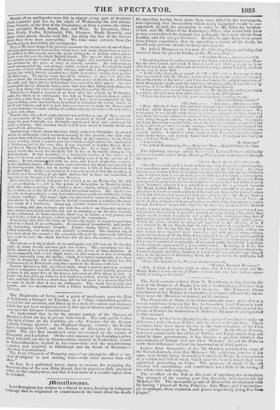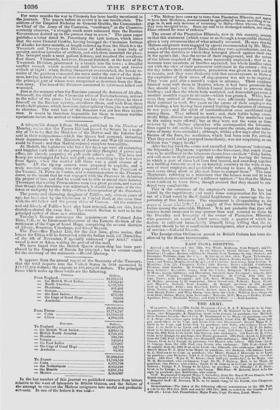The SiLlc contains a letter from St. Petersburg, stating that
the ill- ness of the Empress of Russia has taken so alarming a eh:teener that little hopes are entertained of her recovery. The Emperor, whose attachment to her Majesty is exemplary, is so inue'l inflicted that he re- fuses to see his Ministers or transact pme,lie business.
The Portervlio of Malta, in its Constantinople 1101-5, state: that at a recent conference between the five A mbaesalore. Lord Ponsonhy took up one ot' the candles. and, blowher it one sael, that for the general in- terests of Europe the domination of' :Mehemet Ali must be extinguished jut like manner.
3feheinet .11i has been playing the deep game of seeking to make up ditlereeces with Chosrew Peelle, and to steed well with hint. These overtures have been made known to the representatives of the Five Powers at the capital of the Turkish empire. As the Great Powers, however, cannot settle the affairs of Turkey and li,gypt nuless they are aided by those governments. it has beeome a question whether the governments of Europe will not allow Mehemet AU and the Porte to settle their differences without the intervention of third parties.
Letters from Alexandriut. of the NI Oetober, pnblished by some of the French journals. state diet Mehemet Ali, with forty persons of his suite, were nearly being drowned at Cafreris-el-Ma lja, in eonsequence of a sadden and violent wiad, which upset the boat in which they were embarked, proceeding- to Cairo. The presence of mind of the old Viceroy was astonishing, and contributed not a little to the saving of the whole crew and company.
The overflow of the Nile is this year, if anything, too redundant. The prospect of the ensuing year was therefore most favourable for Mehemet Ali. The mercantile people of Alexandria are charmed with Isis having " placed all Syria, Palestine, Asia Minor, and Constantino- ple in pratique, those countries and places respectively...being free from plague." For some months the war in Circassia has been hardly mentioned in the journals. The papers before us revive it in our recollection. The address of the Emperor Nicholas to General Grabbe, the Commandet- in-Chief of the Army of the Caucasus, "confesses," as the Commerce correctly observes, "a struggle much more animated than the Russian Government desired up to the present time to avow." The same paper publishes a letter dated St. Petersburg the 12th instant, which states that the sante General Grabbe, having besieged the Circassian fortress of Akulko for three months, at length ordered up from the Black Sea the Twentieth and Twenty-first Divisions of Infantry, a large body of cavalry, and four batteries of artillery, and with them assaulted the place. The besieged made a most gallant defence, and repulsed the assailants four times. Ultimately, however, General Galafiief, at the head of the Twentieth Division, penetrated by a breach into the town ; a dreadful conflict ensued, which continued until between eleven and twelve o'clock at night ; when, feeling themselves overmatched, the heroic re- mains of the garrison evacuated the town under the cover of the dark- ness, leaving behind them of their number 562 dead and 122
the principal principal part of whom were recognized as deserters from the Rus- sian army. The loss of the Russians amounted to 5,650 men killed and wounded.
Just at the moment when the Russians entered the fortress of Akulko, Sehamadi, the chief of the Circassian tribe of Tschetschentses, arrived to the relief of the place ; but being too late for that object, he threw *himself on the Russian cavalry, overthrew them, and took from them twelve field-pieces; which, however, (after spiking them,) he was obliged to abandon. The total loss of the Russians was not less than 12,000 men. It would be therefore impossible for them to resume warlike -operations before the arrival of reinRtreements.—Thnes.



























 Previous page
Previous page